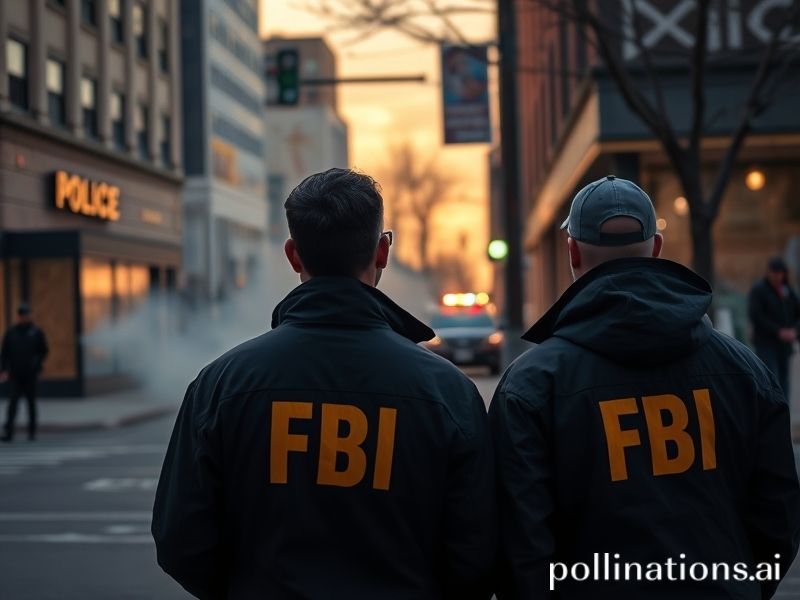When the Feds Snitch on Themselves: How One FBI Agent’s ‘Courtesy Call’ Became a Global Punchline
It was, in the end, a very American sort of dénouement: the Federal Bureau of Investigation—an outfit that once chased bank-robbing folk heroes through the Dust Bowl—announced it had finally arrested one of its own for allegedly tipping off the Minneapolis police officer who murdered George Floyd. Special Agent McKinley, a man whose career arc now resembles a flaming boomerang, stands accused of warning Derek Chauvin that Floyd’s death might attract “federal heat,” a phrase that sounds like it was lifted from a B-grade mafia flick yet somehow made it into official charging documents. Cue the slow clap from every other nation that long ago filed the United States under “interesting case study.”
Across the Atlantic, the French yawned—partly because it was August and half the country was on strike, but mostly because they’ve seen their own police break a few spines and collude to hide it. In Berlin, activists forwarded the indictment around like a digital postcard: “Proof the rot goes to the very top, even when ‘the top’ is only the 15th floor of the Whipple Building.” Meanwhile, in Lagos, Nigerian civil-society types noted the irony that an American federal agent might do time for obstructing justice while their own officers still moonlight as extortion artists with government-issued rifles. Global solidarity, it turns out, is less a warm hug and more a grim exchange of trading cards: “Your corruption? Cute. Here’s ours.”
The FBI itself has always had a flair for tragicomic branding. Its motto—Fidelity, Bravery, Integrity—reads like a self-help seminar title, yet statistically fails to preclude the occasional rogue agent who treats civil rights like a speed bump. The McKinley episode merely confirms what the rest of the planet long suspected: that America’s most cinematic police force can’t always tell the difference between a movie script and probable cause. Still, the optics are exquisite. Imagine the PowerPoint deck at Quantico: “Lesson 3—Don’t WhatsApp murder suspects.” Somewhere, J. Edgar Hoover is revolving in a very expensive grave.
Internationally, the arrest lands amid a broader audit of policing itself. From the barricades of Santiago to the tear-gassed boulevards of Beirut, protestors recognize a universal dialect: batons speak the same language, whether stamped “NYPD” or “Carabineros de Chile.” What’s new is the spectacle of accountability trickling upward. If an FBI agent—armed with a badge, a Glock, and a pension plan—can face justice, perhaps the chain of command isn’t a perpetual escape hatch after all. That’s the theory, anyway. Skeptics from Johannesburg to Jakarta prefer to bet on gravity: what goes up must be quietly reassigned with full benefits.
One must admire the bureaucratic choreography. The Department of Justice waited until Chauvin’s state conviction was secure, then tiptoed in like a dinner guest arriving just as the soufflé collapses. It’s a legal waltz designed to avoid the appearance of piling on—though piling on, in this case, feels less like cruelty and more like overdue pest control. Still, timing is everything: drop the indictment right before the midterms, and suddenly “rule of law” becomes a campaign slogan you can slap on a yard sign next to the inflatable Santa.
For dictators taking notes, the takeaway is delightfully perverse. China’s state media framed the story as evidence that American institutions are “terminally hypocritical,” neatly ignoring that their own internal investigators vanish if they so much as blink. Russia’s foreign ministry issued a statement demanding the U.S. “address systemic racism,” a line clearly written by someone who giggled while typing. Even the North Koreans weighed in, proving that no international embarrassment is too obscure for Pyongyang’s press pool. Somewhere, a propaganda intern earned an extra bowl of rice for that headline.
Yet beneath the snark lies a quieter revelation. The world keeps watching because America still insists on airing its dirty laundry in Dolby surround sound. Other nations bury their scandals under libel laws or midnight excavations; the United States live-streams its grand juries and sells the popcorn. It’s democracy as reality TV—vulgar, addictive, occasionally rerouted by advertisers—and the global audience can’t look away. Floyd’s death became a planetary mirror: every country saw its own reflection, distorted but recognizable.
So here we are, three years and several continents removed from a knee on a neck, and the epilogue arrives courtesy of an FBI agent who apparently believed “protect and serve” included sending courtesy memos to the executioner. The moral, if one insists on such antiques, is that oversight occasionally works—just slowly, erratically, and only after someone leaks the group chat. The rest of us can update our scorecards and wait for the next episode. Curtain falls, credits roll, and somewhere a translator in Kuala Lumpur wonders how to render “federal heat” into Bahasa without laughing.







